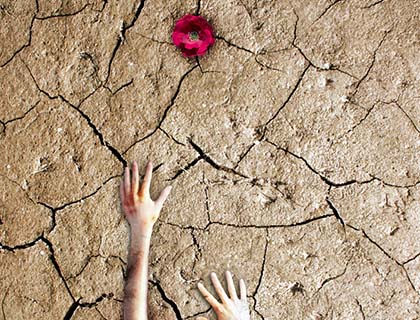She can no more confide her pains and secrets to her friends by means of words, but through tearful eyes. What she can do is to reflect her bleeding wounds and convey her dolorous messages via shedding bitter tears. She was born in the patriarchal land – where women and girls are doomed to cruel fate. It was not the mark of a golden necklace under her chin but of a villain’s keen knife – who sinisterly plotted to kill her in cold blood.
Gul Seema, a hapless bride, survived a fatal act of violence. The thick stains of blood on her lapel and the stab wounds on her throat revealed the bestiality of a misogynist. Her words were stifled for the whole life; however, the slash shows that the perpetrator intended to slaughter her on the spot. Furthermore, she was forced by her husband to swallow a pin – perhaps to show her death natural.
In a report ‘Their lives on the Line’, the human rights watchdog urged the Afghan government to meet its obligations to ensure gender equality and address discriminatory social attitudes. Amnesty International said the authorizes are doing nothing to prevent the escalation of violence – including sexual assault, threats and even assassinations – especially against women’s rights defenders.
According to Salil Shetty, Amnesty International’s Secretary General, the lack of protection is “simply shocking.” He told journalists that “Women human rights defenders from all walks of life have fought bravely for some significant gains over the past 14 years – many have even paid their lives. It’s outrageous that Afghan authorities are leaving them to fend for themselves, with their situation mare dangerous than ever.”
The statement is based upon 50 interviews collected by the watchdog`s researchers with women’s rights defenders as well as their relatives across the country.
While the international community has already spent hundreds of millions of dollars into projects that aim to support women in Afghanistan, now it seems these achievements are at risk.
The publication is indeed rather timely. It follows some high-profile cases of abuse and violence.
On March 19, a mob of men beat a 27-year-old woman named Farkhunda to death, threw her body off a roof, ran over it with a car, set it on fire and at the end, threw it into the Kabul River. The attack was captured by mobile phone cameras and was widely shared on social media. The woman had been falsely accused of burning a Holy Koran. Her death led to massive protests across the country, 26 arrests and renewed calls for authorities to ensure that women are protected from violence in Afghanistan. Four of the perpetrators have been sentenced to death in primary court, but 18 were exonerated for having no documents available against them – the human rights’ activists in the country urge the court to revise its decision regarding the 18 who were proved innocent.
In 2011, a Thomson Reuters Foundation poll called Afghanistan as the most dangerous place in the world for women.
Since then little seems to have changed. Afghan women rights defenders continue their work placing their lives constantly on the line.
Since the fall of the Taliban in 2001, Afghan women have made significant advances in rights, with millions of girls attending schools and women holding government posts. But with the steady withdrawal of foreign forces and the Taliban insurgency still resilient, there are growing fears the gains will be lost. “Afghanistan is facing an uncertain future, and is at arguably the most critical moment in its recent history. Now is not the time for international governments to walk away,” Shetty said.
Despite the progress made, women’s struggle for civic and human rights still has a long way to go. Three decades of war has left many Afghans both eager for change and afraid of it. There are still many instances of ordinary women experiencing domestic violence, being sexually abused, or being forced into marriage. Women in senior leadership roles – such as in parliament or the police – are still being murdered. Some men feel threatened by the presence of women in senior positions. These men see women’s rights as the “westernization” of Afghan culture.
In the patriarchal society of Afghanistan, women are expected to adopt a second position. Traditionally, they have to endure the bitterness of life without a word of protest. Their husbands are their full-authorized masters who can always order them around and treat them as slaves.
Honor killings are a common form of violence against women across our country. Women are killed for reasons such as refusing to enter an arranged marriage, being in a relationship that is disapproved by their relatives, attempting to leave a marriage, becoming the victim of rape, dressing in ways which are deemed inappropriate, etc.
The violence against women can occur in both public and private spheres of life and at any time of their life span. Many women are terrified by these threats of violence and this essentially has an impact on their lives that they are impeded to exercise their human rights, for instance, the fear for contribution to the development of their communities socially, economically and politically.
Reports says that most women do not seek legal assistance for domestic or sexual abuse for fear of prosecution or being returned to their family or the perpetrator or because they don’t know their rights.
It is hoped that women’s rights and dignity be held in respect. They will not be considered as second class citizen or treated as an object. Since women form the society’s half population, they play a highly integral role in case of being provided the opportunity otherwise half of the society will be paralyzed.

